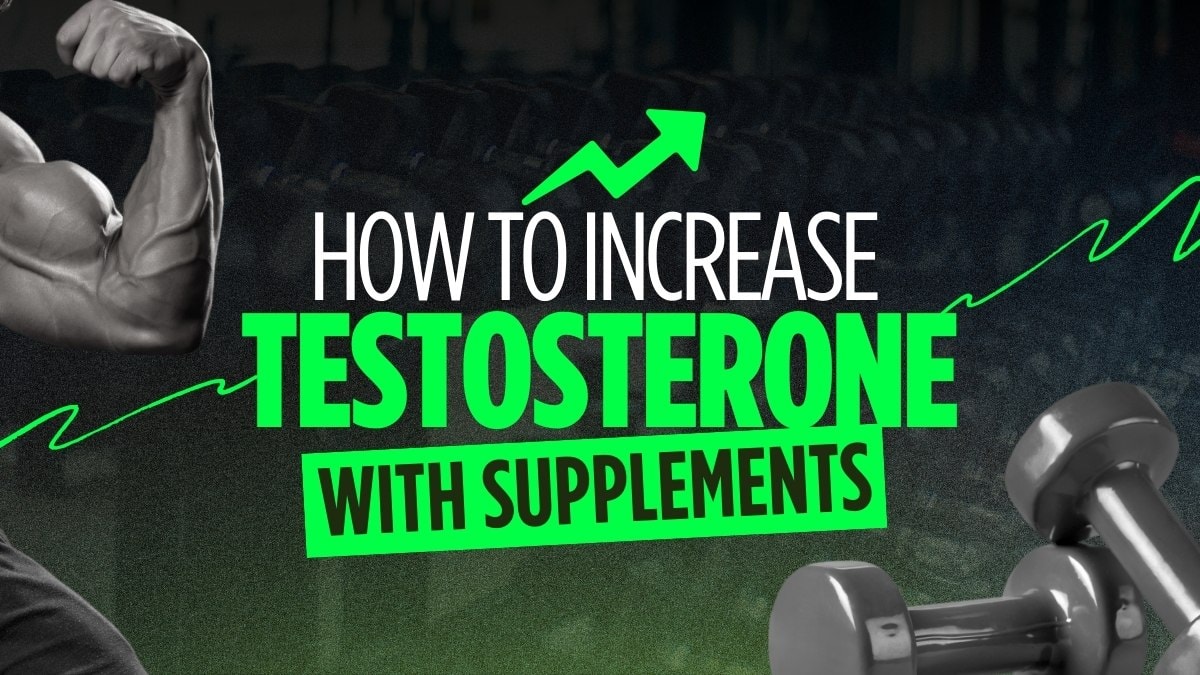
You’ve likely stumbled upon those multi-ingredient “natural testosterone boosters,” promising everything from Herculean strength to boundless energy. And maybe, just maybe, you’ve rolled your eyes. Skepticism is healthy!
But what if there’s more to them than slick marketing? This article is your comprehensive guide to naturally boosting your T levels.
We’re cutting through the noise, diving into the science behind testosterone ingredients, and comparing them head-to-head with anabolic steroids.
We’ll reveal the most effective ways to increase testosterone, share expert insights on the topic, and finally answer those burning questions keeping you up at night.
What Supplements Increase Testosterone Fast?
Testosterone boosters contain plant extracts and various vitamins and minerals, which are designed to increase your T levels. While it may take several months to see the full effects, you should notice a difference in as little as 3 to 8 weeks.
The ingredients in these supplements can vary, but the most common ones backed by research are:
- D-Aspartic Acid: Clinical trials show that a daily three-gram dose of D-aspartic acid can boost total testosterone in untrained men by roughly 42%. Additionally, D-aspartate sodium treatment has been shown to improve sperm count and motility in sub-fertile men, leading to increased pregnancy rates in their partners [1] [2].
- Ashwagandha: An eight-week, controlled study revealed that twice-daily doses of 300 mg ashwagandha root extract significantly improved sexual well-being and boosted normal testosterone levels in all participants [3].
- Zinc: A comprehensive review of 38 studies, encompassing both human and animal research, confirmed that zinc deficiency lowers testosterone while supplementation raises it [4].
- Fenugreek: In an eight-week study, healthy men engaged in resistance training while taking either 300 mg of fenugreek or a placebo. The fenugreek group showed notable anabolic and androgenic activity and significant body fat reduction without compromising muscle strength or endurance [5].
- Ginseng: A review analyzing clinical trials determined that red ginseng may positively impact male reproductive health, showing promise in treating infertility, erectile dysfunction, and prostate diseases through its specific mechanisms [6].
- Vitamin D: A detailed analysis showed only a link between vitamin D and testosterone levels in individuals with morbid obesity. This implies that vitamin D supplementation might be most effective for those with a significant testosterone deficiency, explaining why many studies find no effect in broader populations [7].
Can Supplements Increase Testosterone Long-Term?
Yes. Taking the right supplements in the right quantities can help boost your testosterone levels. There are three things to keep in mind:
- Dose: Supplement ingredients and doses can vary. Ensure you choose a supplement with safe and adequate quantities of the key ingredients.
- Ingredients: Ensure that the ingredients in your testosterone booster are scientifically backed to increase testosterone production.
- Quality: Look for supplements from reputable companies with good customer reviews, like TestoPrime.
Supplements vs. Anabolic Steroids
Both testosterone supplements and anabolic steroids can increase your testosterone levels. However, testosterone boosters are legal and mainly contain natural ingredients, which lowers the risk of associated adverse side effects.
Testosterone boosters stimulate your body to produce more testosterone. However, anabolic steroids can lower your natural testosterone production by replacing it with a synthetic version of the hormone.
Anabolic steroids are illegal and can be harmful. Common side effects may include male pattern baldness, significantly increased blood pressure, elevated risk of heart attack or heart disease, and potential links to worsened prostate cancer outcomes. It is important to note that natural testosterone boosters do not carry the same risks as anabolic steroids.
What Is the Most Effective Way To Increase Testosterone?
Supplements can naturally boost testosterone levels, but you can also make lifestyle changes to help increase your testosterone levels. When combined, this is an effective way to improve your levels.
Lifestyle changes include exercising, following a healthy meal plan like the GOLO diet, drinking enough water, reducing alcohol intake, and getting enough sleep.
How To Use Supplements for Maximum Effectiveness
Alright, you’ve got your hands on a natural testosterone booster–what do you do next? Don’t just pop pills and hope for magic.
When To Take Testosterone Supplement
Consistency is key; follow the recommended dosage religiously and take it at the same time each day, ideally with food, to maximize absorption.
Supporting Supplements With Lifestyle Changes
Natural supplements like testosterone boosters are tools, not shortcuts. If you use them wisely, you’ll be on your way to maximizing those T-boosting benefits. Here’s how to naturally increase testosterone with supplements and lifestyle changes:
Diet
Prioritize real, whole foods that support hormone production. Load up on lean protein, especially chicken, fish, and beef, to provide the building blocks for testosterone. Healthy fats, like avocados, nuts, and olive oil, are essential for hormone synthesis.
Don’t skimp on your greens; leafy veggies provide vital nutrients and help regulate estrogen. And ditch the processed foods; sugar and refined carbs are testosterone’s worst enemies.
Exercise
Heavy, compound exercise movements will get you the results you need faster. Also, aim for at least 3 to 4 intense sessions per week, pushing your limits. Remember, you’re not just building muscle; you’re signaling to your body that it needs to produce more testosterone. These workouts can also contribute to weight loss, alongside the hormonal benefits.
Sleep & Stress Management
During sleep, your body repairs and regenerates, including testosterone production. Chronic stress, on the other hand, is a testosterone killer. Cortisol, the stress hormone, suppresses testosterone. Find healthy ways to manage stress: meditation, yoga, deep breathing, or even just a walk in nature.
What Supplements Increase Testosterone in Females
Look for supplements with ashwagandha, zinc, and vitamin D. Lower testosterone levels are normal for women, but sometimes, a little boost can offer benefits like improved libido, increased energy, and enhanced mood. However, always consult your healthcare provider before you start taking any supplement, especially if you have underlying health conditions.
Expert Insights
Before considering medication for low testosterone, men should explore intensive lifestyle modifications, as advised in an article reviewed by Havard Health’s Howard E. LeWine. These changes center on achieving and maintaining a healthy weight through a balanced diet and consistent exercise.
Notably, the article highlights that the most significant testosterone improvements stem from moderate- to high-intensity resistance exercises targeting large muscle groups, such as squats and bench presses.
Furthermore, the importance of sleep is underscored, with the article stating, ‘Most testosterone release occurs during sleep, particularly during the rapid eye movement (REM) stage.’
Consequently, aiming for 7 to 9 hours of quality sleep is crucial for supporting healthy hormone production [8].
Adding to this, Dr. Robert Z. Edwards, writing for the US Department of Veterans Affairs, emphasizes avoiding testosterone-killing habits: ditch tobacco, curb alcohol, and steer clear of opioids, xenobiotics, and chronic stress.
Dr. Edwards emphasizes how to increase testosterone levels without supplements, highlighting how lifestyle changes surpass the benefits of supplements. However, he suggests that some nutrients are known to inhibit aromatase, which may offer additive benefits, especially if you have deficiencies.
Dr. Robert Z. Edwards recommends zinc (25-50 micrograms daily), quercetin (400 micrograms daily), grape seed extract (100-300 micrograms daily), and DHEA (25-50 micrograms daily). Essentially, supplements can support a healthy lifestyle, but they’re not a standalone solution [9].
FAQs on How To Increase Testosterone
In this section, we’ll answer other questions you may have that are synonyms with the question of how to increase testosterone with supplements.
What Supplement Increases Testosterone the Most?
Natural supplements, like TestoPrime, can support normal testosterone levels, but results vary and are generally less dramatic. Clinical testosterone replacement therapy (TRT), a kind of hormone therapy prescribed by a healthcare provider, provides the most significant increase.
How To Increase Testosterone Levels Quickly With Pills?
There are no natural “pills” that dramatically increase testosterone levels quickly. While some supplements may offer subtle support over time, significant T-level changes require prescription medication and medical supervision.
Do Any Testosterone Boosters Really Work?
Some natural testosterone boosters may offer mild support, particularly for those with huge deficiencies, but they’re not miracle pills. Lifestyle changes—diet, exercise, sleep—are far more impactful. Anabolic steroids, while powerful, carry significant risks and aren’t recommended.
What Drastically Increases Testosterone?
Nothing “drastically” increases testosterone safely and sustainably without medical intervention. Anabolic steroids do, but they come with significant risks. So, what supplements can you take to increase testosterone safely? TestoPrime is a suitable option. And when paired with consistent exercise, a healthy diet, and adequate sleep, it can offer gradual, healthier improvements.
How To Tell if You’re Low on Testosterone?
Low testosterone can manifest in various ways: decreased libido, fatigue, muscle loss, erectile dysfunction, mood changes, and difficulty concentrating. If you’re experiencing several of these symptoms, consult your doctor for a blood test to confirm.
Which Fruit Is Best for Testosterone?
Pomegranates and watermelon are often highlighted for their potential testosterone-boosting properties, though a balanced diet is key [10].
How To Increase Testosterone With Supplements: Final Thoughts
Taking supplements can have a positive impact on your testosterone levels, particularly if they are combined with a testosterone booster. These supplements have adequate scientifically proven ingredients and are well-tolerated and legal.
While it can take several months to see the full effects of the testosterone booster, you should notice a difference in some areas, particularly libido and energy levels, within 3 to 8 weeks.
 11 Niche Experts
11 Niche Experts
 100+ Product Reviews
100+ Product Reviews
 50+ Tested Products
50+ Tested Products
At BestDaily, our mission is simple: to help you make confident, informed decisions about the products that impact your daily life. Whether you're searching for wellness essentials or lifestyle upgrades, we combine hands-on testing with expert analysis to highlight what truly works.

